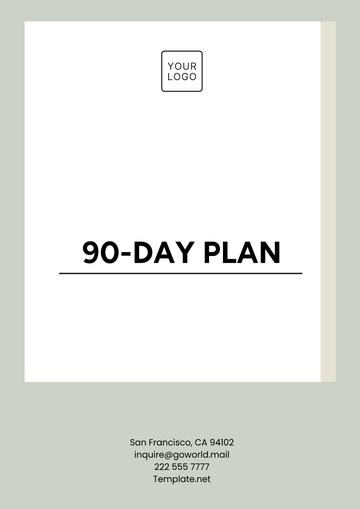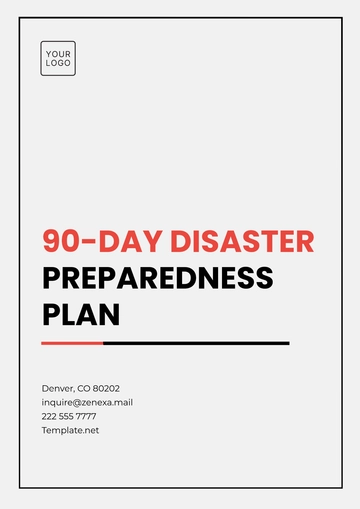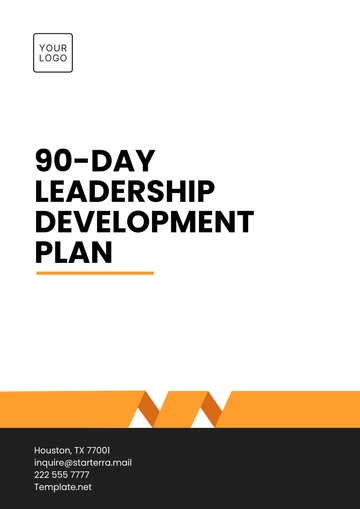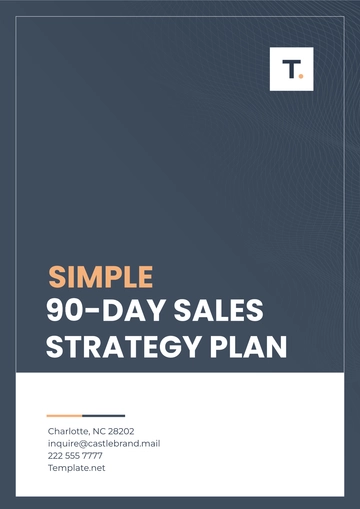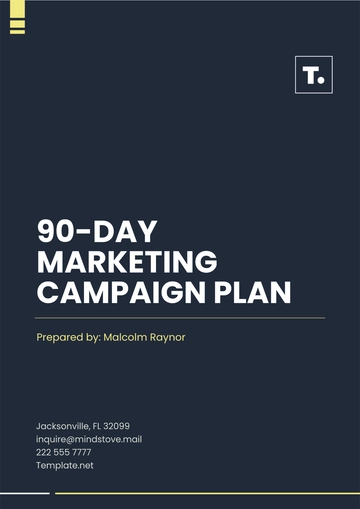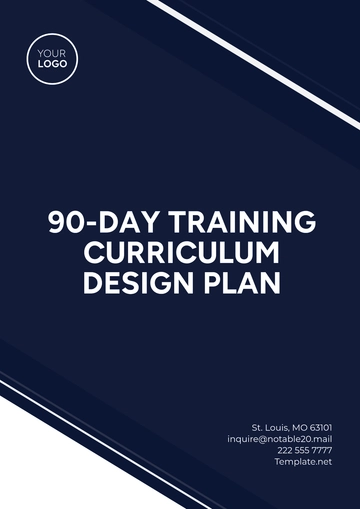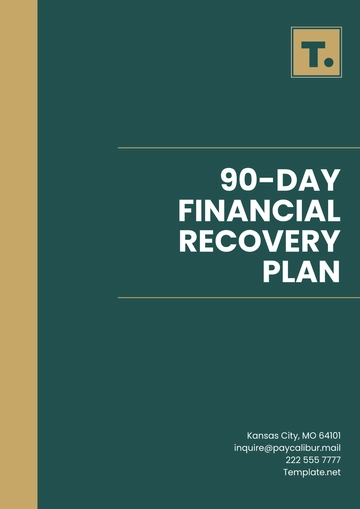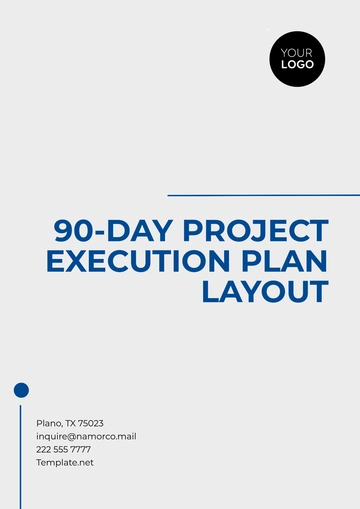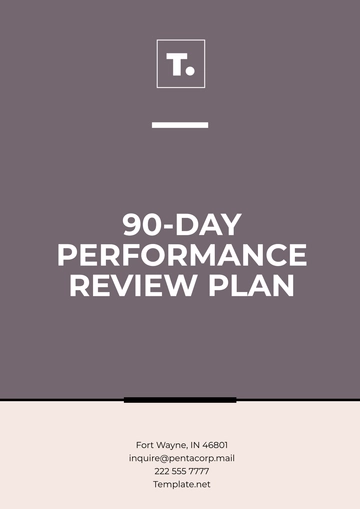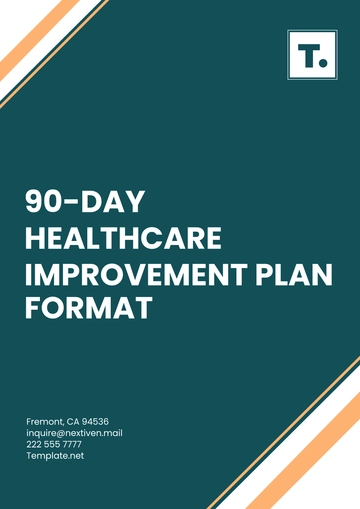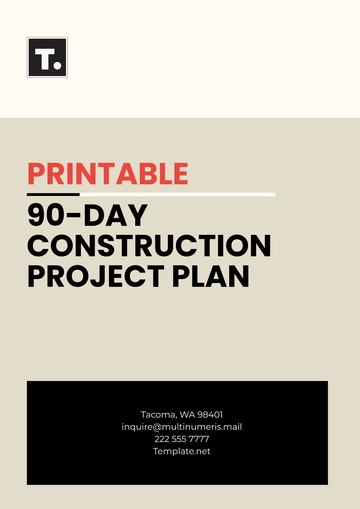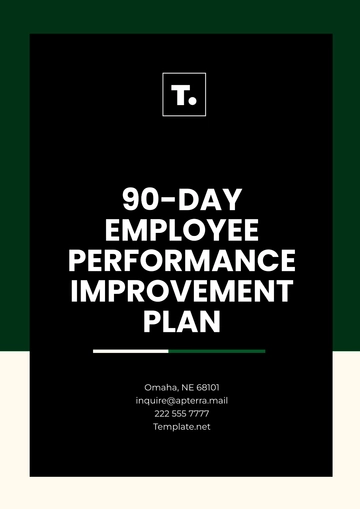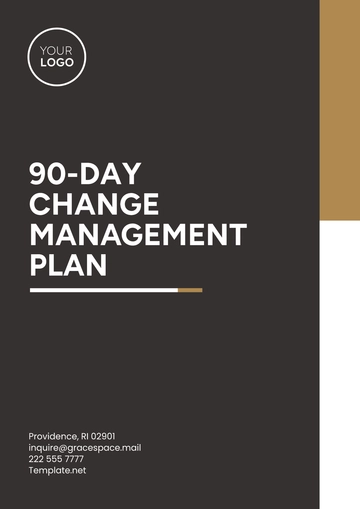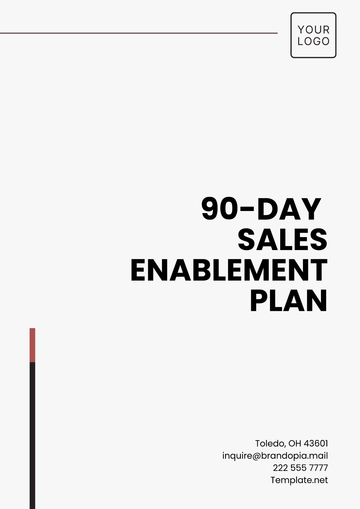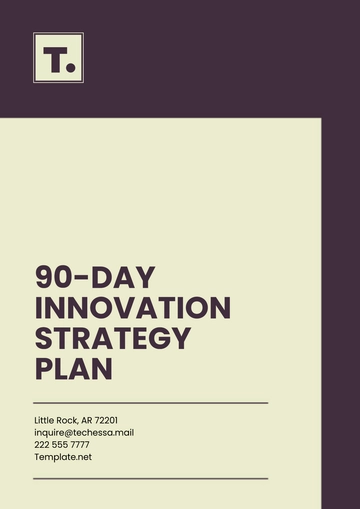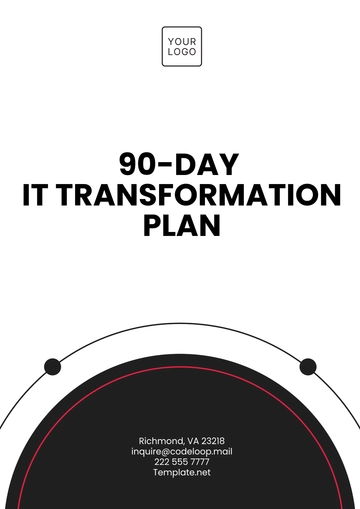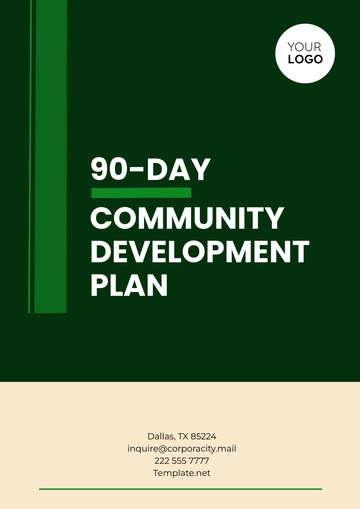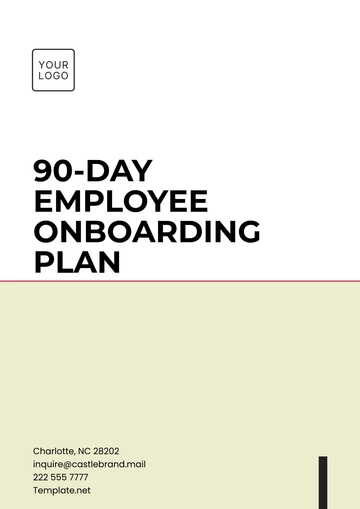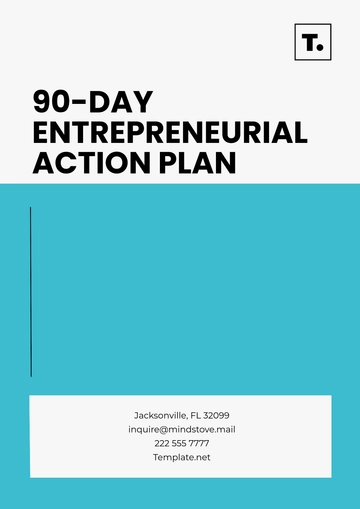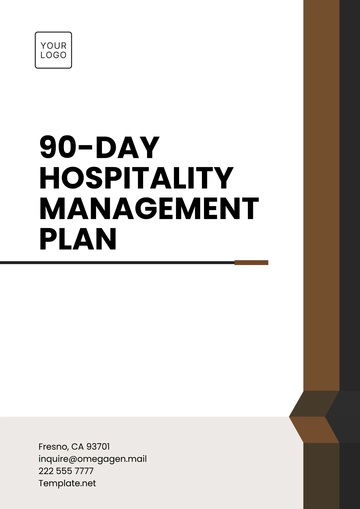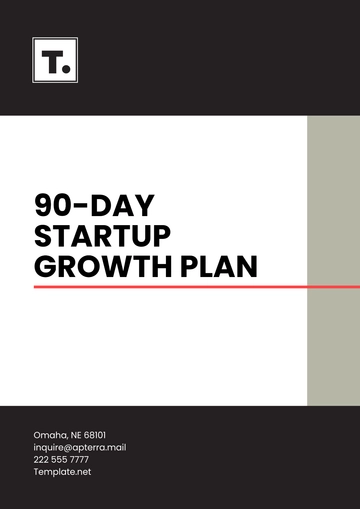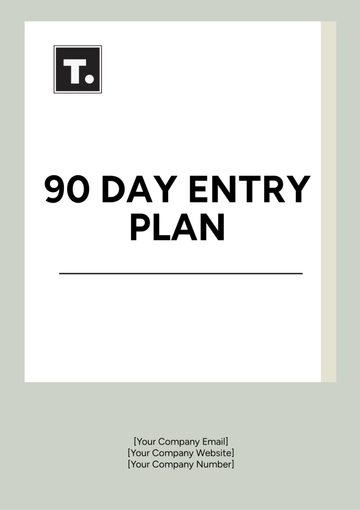Free 90-Day Hospitality Management Plan
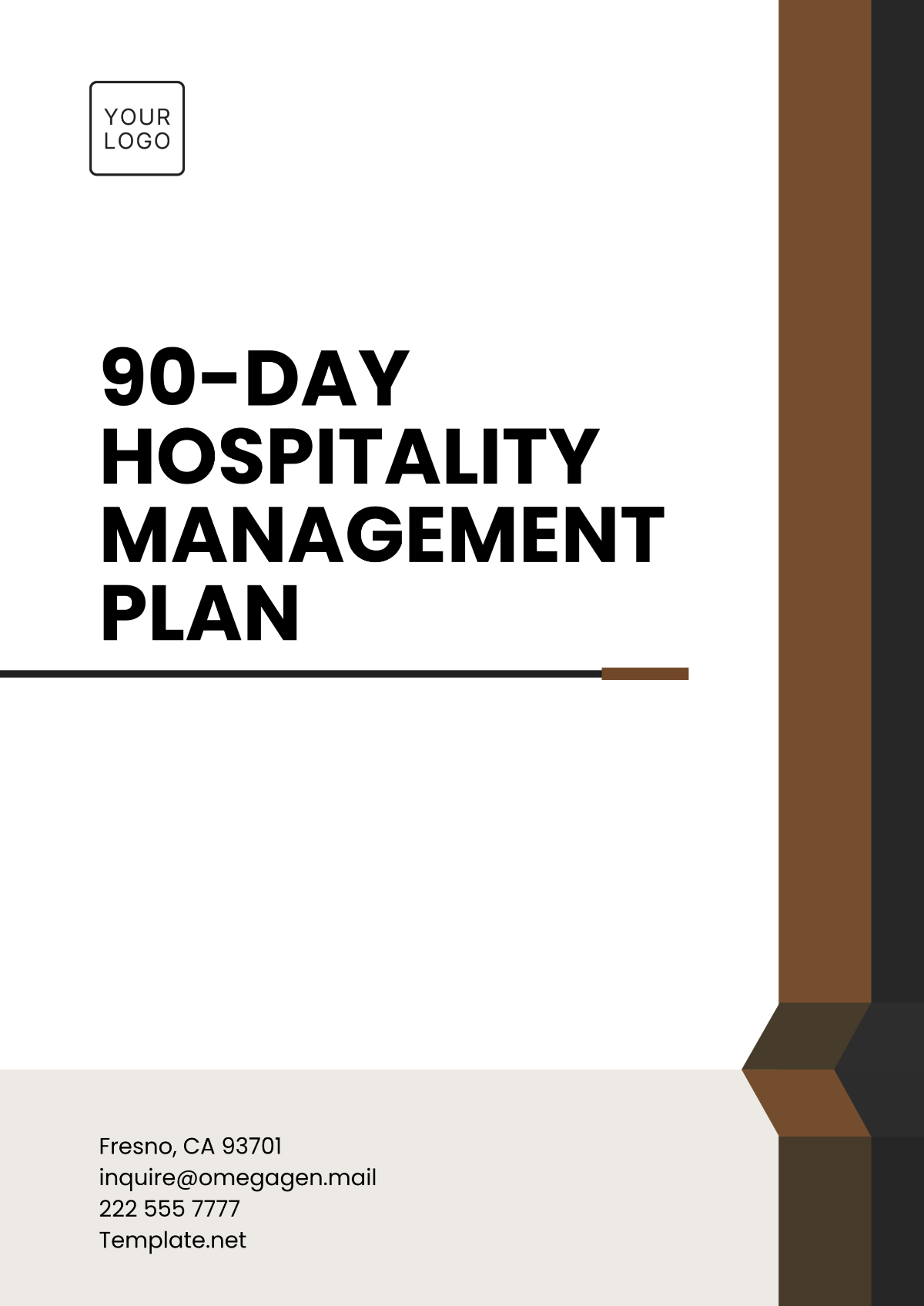
Prepared by:
[Your Name]
[Your Company Name]
Introduction
This 90-day Hospitality Management Plan is designed to guide the operational, strategic, and service improvements in the hospitality business. Whether you're launching a new establishment, undergoing management changes, or aiming to address performance challenges, this plan provides a clear roadmap for the first three months to set the foundation for long-term success.
Objective of the Plan
The goal of this 90-day Plan is to:
Ensure smooth operations from day one.
Enhance guest satisfaction and staff performance.
Improve operational efficiency.
Set the groundwork for long-term strategic growth.
Phase 1: Assessment and Foundation Building (Days 1-30)
Key Activities
Operational Audit and Assessment
Conduct a thorough review of current operations, including guest services, room quality, housekeeping, food & beverage, and amenities.
Identify strengths, weaknesses, and areas of immediate concern.
Team Introduction and Training
Meet with department heads and key staff to introduce the plan and set expectations.
Organize training sessions on customer service standards, safety protocols, and operational procedures.
Customer Experience Evaluation
Review guest feedback (online reviews, surveys, in-house feedback) to identify immediate issues.
Implement quick fixes to address urgent guest concerns (e.g., improving the check-in/check-out process, and enhancing cleanliness).
Set Operational Goals
Establish measurable goals for guest satisfaction, room occupancy, service efficiency, and revenue generation.
Define key performance indicators (KPIs) for the team to track progress.
Brand & Marketing Review
Evaluate current marketing strategies and assess the brand positioning.
Adjust any ongoing marketing campaigns to align with business objectives.
Key Deliverables
Operational audit report.
Staff training schedules and attendance.
Immediate action plan for guest service improvements.
Marketing and branding strategy overview.
Phase 2: Implementation and Optimization (Days 31-60)
Key Activities
Operational Improvements
Implement process improvements in housekeeping, guest services, and front desk operations.
Streamline the guest check-in/check-out process, improving efficiency and customer satisfaction.
Team Development and Performance Monitoring
Regularly monitor staff performance against established KPIs and provide feedback.
Foster a culture of teamwork through team-building activities and regular communication.
Customer Satisfaction Initiatives
Launch new guest loyalty programs or special promotions to increase repeat visits.
Continue gathering guest feedback and adjust services based on insights.
Facility Enhancements
Address any immediate facility maintenance issues (e.g., upgrading amenities, addressing room maintenance problems).
Implement cost-effective improvements that directly enhance the guest experience.
Revenue Management Strategies
Implement pricing strategies to optimize occupancy and revenue, adjusting rates based on demand patterns.
Explore upsell opportunities (e.g., premium services, packages).
Key Deliverables
Operational process improvement reports.
Staff performance evaluations and development plans.
Customer satisfaction survey results and follow-up actions.
Updated revenue management strategy.
Phase 3: Evaluation and Strategic Planning (Days 61-90)
Key Activities
Review and Analyze Progress
Evaluate the performance of all departments based on the goals set in Phase 1.
Analyze guest feedback, occupancy rates, and revenue metrics to assess progress toward achieving KPIs.
Long-term Strategy Planning
Based on insights gained in the first 60 days, begin developing long-term strategies for growth, brand expansion, and market positioning.
Define the next set of objectives for the next quarter, focusing on service improvements, revenue targets, and customer engagement.
Staff Retention and Development
Evaluate staff performance and retention. Develop a plan for ongoing training and professional development.
Review compensation and incentive structures to ensure alignment with business goals and employee motivation.
Marketing and Public Relations Initiatives
Continue to refine the marketing and branding strategies based on the business's early successes and challenges.
Increase outreach and visibility in the market, utilizing guest testimonials, online reviews, and media coverage to boost brand reputation.
Final Performance Review
Conduct a comprehensive review of financial performance, operational metrics, and customer satisfaction.
Present a final report on the outcomes of the 90-day plan and provide recommendations for the next steps.
Key Deliverables
Final performance review and analysis.
Long-term strategic plan for business growth.
Staff development and retention plan.
Updated marketing and PR strategy.
Conclusion
The 90-Day Hospitality Management Plan serves as a focused, actionable guide for new or transitioning hospitality businesses. By systematically assessing, implementing, and optimizing operations and guest services, this plan ensures that the business not only delivers a superior guest experience but also positions itself for long-term success in a competitive industry.
- 100% Customizable, free editor
- Access 1 Million+ Templates, photo’s & graphics
- Download or share as a template
- Click and replace photos, graphics, text, backgrounds
- Resize, crop, AI write & more
- Access advanced editor
Enhance guest experiences with Template.net's 90-Day Hospitality Management Plan Template. This editable and customizable template helps you organize operations, improve services, and achieve management goals effectively. Editable in our AI Editor Tool, it allows easy adjustments to fit your hospitality business needs. Perfect for managers, this template ensures a structured and successful management strategy.
You may also like
- Finance Plan
- Construction Plan
- Sales Plan
- Development Plan
- Career Plan
- Budget Plan
- HR Plan
- Education Plan
- Transition Plan
- Work Plan
- Training Plan
- Communication Plan
- Operation Plan
- Health And Safety Plan
- Strategy Plan
- Professional Development Plan
- Advertising Plan
- Risk Management Plan
- Restaurant Plan
- School Plan
- Nursing Home Patient Care Plan
- Nursing Care Plan
- Plan Event
- Startup Plan
- Social Media Plan
- Staffing Plan
- Annual Plan
- Content Plan
- Payment Plan
- Implementation Plan
- Hotel Plan
- Workout Plan
- Accounting Plan
- Campaign Plan
- Essay Plan
- 30 60 90 Day Plan
- Research Plan
- Recruitment Plan
- 90 Day Plan
- Quarterly Plan
- Emergency Plan
- 5 Year Plan
- Gym Plan
- Personal Plan
- IT and Software Plan
- Treatment Plan
- Real Estate Plan
- Law Firm Plan
- Healthcare Plan
- Improvement Plan
- Media Plan
- 5 Year Business Plan
- Learning Plan
- Marketing Campaign Plan
- Travel Agency Plan
- Cleaning Services Plan
- Interior Design Plan
- Performance Plan
- PR Plan
- Birth Plan
- Life Plan
- SEO Plan
- Disaster Recovery Plan
- Continuity Plan
- Launch Plan
- Legal Plan
- Behavior Plan
- Performance Improvement Plan
- Salon Plan
- Security Plan
- Security Management Plan
- Employee Development Plan
- Quality Plan
- Service Improvement Plan
- Growth Plan
- Incident Response Plan
- Basketball Plan
- Emergency Action Plan
- Product Launch Plan
- Spa Plan
- Employee Training Plan
- Data Analysis Plan
- Employee Action Plan
- Territory Plan
- Audit Plan
- Classroom Plan
- Activity Plan
- Parenting Plan
- Care Plan
- Project Execution Plan
- Exercise Plan
- Internship Plan
- Software Development Plan
- Continuous Improvement Plan
- Leave Plan
- 90 Day Sales Plan
- Advertising Agency Plan
- Employee Transition Plan
- Smart Action Plan
- Workplace Safety Plan
- Behavior Change Plan
- Contingency Plan
- Continuity of Operations Plan
- Health Plan
- Quality Control Plan
- Self Plan
- Sports Development Plan
- Change Management Plan
- Ecommerce Plan
- Personal Financial Plan
- Process Improvement Plan
- 30-60-90 Day Sales Plan
- Crisis Management Plan
- Engagement Plan
- Execution Plan
- Pandemic Plan
- Quality Assurance Plan
- Service Continuity Plan
- Agile Project Plan
- Fundraising Plan
- Job Transition Plan
- Asset Maintenance Plan
- Maintenance Plan
- Software Test Plan
- Staff Training and Development Plan
- 3 Year Plan
- Brand Activation Plan
- Release Plan
- Resource Plan
- Risk Mitigation Plan
- Teacher Plan
- 30 60 90 Day Plan for New Manager
- Food Safety Plan
- Food Truck Plan
- Hiring Plan
- Quality Management Plan
- Wellness Plan
- Behavior Intervention Plan
- Bonus Plan
- Investment Plan
- Maternity Leave Plan
- Pandemic Response Plan
- Succession Planning
- Coaching Plan
- Configuration Management Plan
- Remote Work Plan
- Self Care Plan
- Teaching Plan
- 100-Day Plan
- HACCP Plan
- Student Plan
- Sustainability Plan
- 30 60 90 Day Plan for Interview
- Access Plan
- Site Specific Safety Plan
